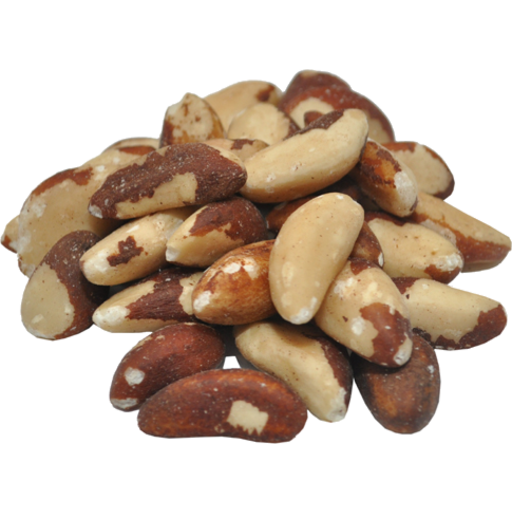Description
Brazil nuts are technically seeds, not nuts, but their brown nut-like casings have led most people to call them nuts. They are produced by a South American tree which tends to grow in virgin rain forests, and they are an extremely popular food source in many Latin American nations, as well of the rest of the world. The nuts have a rich, creamy flavor which lends itself well to an assortment of dishes in addition to being tasty on its own.
Brazil nuts boost health
UNIVERSITY OF OTAGO
WEDNESDAY, 26 MARCH 2008
One Brazil nut a day is enough to raise the average New Zealander's selenium intake to internationally recommended levels and eating two could lead to added health benefits, according to University of Otago researchers.
Department of Human Nutrition Professor Christine Thomson says the new research shows that the nuts are a simple, effective and relatively low-cost way for people to boost their levels of this essential micronutrient.
"There is mounting evidence that a marginal selenium status can lead to an increased risk for a range of conditions, including cancer and cardiovascular disease," she says.
At the same time, there is growing scientific support for the idea that higher intakes may provide additional health benefits, such as enhancing the body's immune system.
Professor Thomson and colleagues carried out the first-ever study to look at how much selenium people can obtain from Brazil nuts and the resulting levels of antioxidant activity in their blood.
Their study has been published in the American Clinical Journal of Nutrition.
Over a 12-week period around 60 volunteers were divided into three groups, one of which ate two Brazil nuts a day, while the other groups were given either a 100 microgramme selenium supplement or a placebo to take daily.
At the outset, the researchers analysed the study members' blood for selenium concentrations and the activity of a key antioxidant, known as glutathione peroxidase (GPx).
The body's production of this vital cellular antioxidant and other important proteins depends on how much selenium is available, she says.
After 12 weeks, the blood selenium concentrations of the Brazil nut group were found to have increased by 64.2 per cent, while blood GPx activity went up by 13.2 per cent.
In the selenium supplement group the increase was 61 per cent and 5.3 per cent respectively.
"These results indicate that including a couple of Brazil nuts a day in the diet could ensure a greatly enhanced selenium status without needing to fortify other foods or take supplements."
Professor Thomson says that while low selenium intakes need addressing, too much of the micronutrient can be toxic.
"People should be careful to limit themselves to no more than a few Brazil nuts per day, otherwise selenium could potentially accumulate to toxic levels in body tissues.
"Also, as the nuts can contain relatively high amounts of the elements barium and thorium, people should avoid eating too many as it is still unclear what intake of these elements might be harmful."

